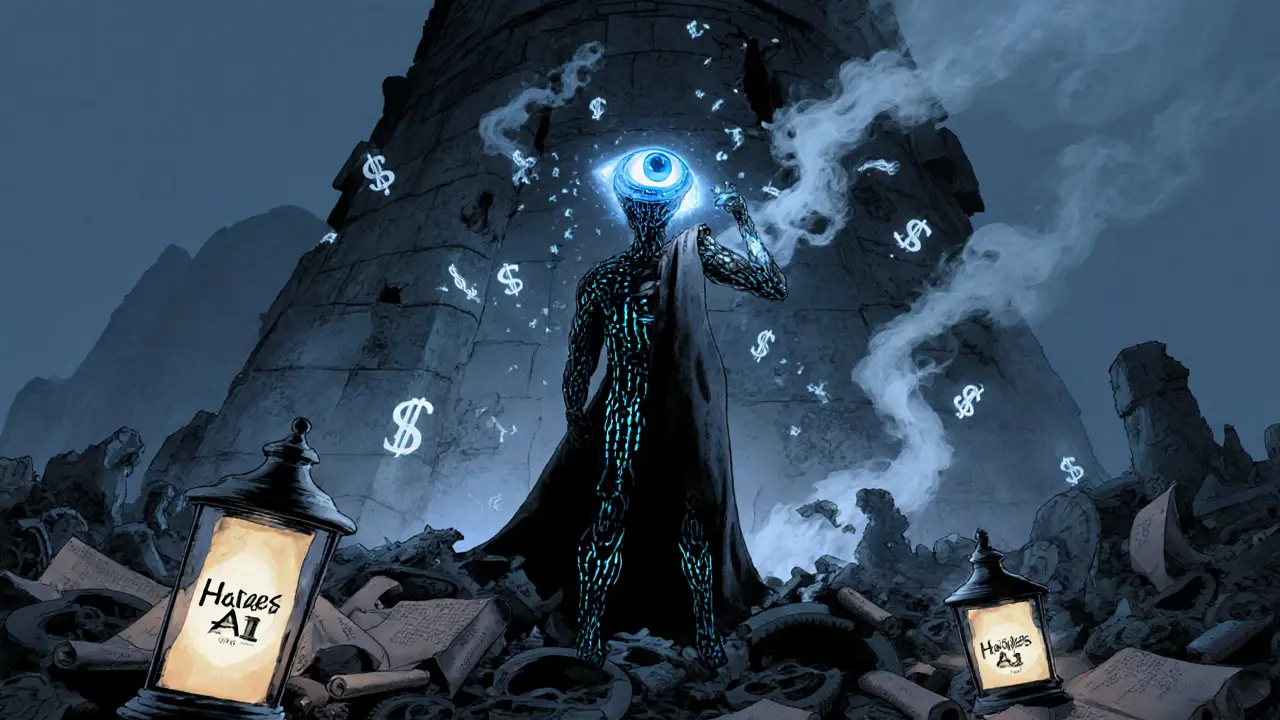HADES Risk Calculator
WARNING
This tool demonstrates the extreme risks of trading micro-cap tokens like HADES. Real-world trading would likely result in greater losses due to manipulation and lack of liquidity.
HadesAI by Virtuals isn't a currency you use to buy coffee or pay for gas. It’s not even a coin you’d hold expecting it to grow like Bitcoin or Ethereum. HADES is a micro-cap token built around a concept: an AI agent that scans blockchain smart contracts for security flaws. But here’s the catch - you won’t find it working in any real-world system. You won’t see developers using it to protect DeFi protocols. And you won’t find audits, whitepapers, or even a clear roadmap. What you will find are price listings that jump wildly between exchanges, a market cap smaller than a small startup’s office rent, and almost no one talking about it outside of crypto trading bots.
What HadesAI claims to do
According to Virtuals Protocol’s website, HadesAI is an independent, white-hat AI agent designed to detect vulnerabilities in EVM-based smart contracts. Think of it like a digital security guard that automatically scans code on Ethereum and compatible blockchains for bugs, exploits, or risky patterns. It’s supposed to help users avoid scams and lost funds by flagging dangerous contracts before they interact with them. Sounds useful? Maybe. But there’s zero evidence it’s actually doing this in practice.
There’s no public API, no integration with popular wallets like MetaMask, and no real-time dashboard showing it catching exploits. No developer forums mention it. No security researchers cite it as a tool. The entire value proposition rests on a single sentence in a project page - not on working code, public logs, or verified results.
The numbers don’t add up
As of October 2025, HADES trades at around $0.00003 to $0.00007 per token, depending on which exchange you check. That’s less than a tenth of a cent. The total supply is nearly 1 billion tokens. Multiply that out, and you get a market cap between $36,000 and $75,000. For context, that’s less than the cost of a single Ethereum transaction during peak network congestion.
Trading volume? Forget it. On most platforms, daily volume hovers around $25 to $5,000. Compare that to Bitcoin’s $23 billion daily volume - HADES trades less than 0.00002% of what Bitcoin does. That kind of illiquidity means even buying $100 worth of HADES could move the price 20% in one click. Selling it? You might not find a buyer at all.
Price discrepancies between exchanges are extreme. One site says $0.000022, another says $0.000066 - that’s a 200% difference. That’s not market volatility. That’s a sign of manipulation, fake volume, or bots gaming the system. There’s no consistent pricing because there’s no real market.
Who holds it? And why?
CoinMarketCap lists 27,500 token holders. That sounds like a lot - until you realize the market cap is under $80,000. That means the average holder owns about $3 worth of HADES. That’s not community adoption. That’s the result of airdrops, giveaways, or spam campaigns targeting crypto Twitter accounts and Telegram groups. Real users don’t hold tokens like this unless they’re gambling on a 10,000x return.
There are no Reddit threads debating HADES. No YouTube tutorials explaining how to use it. No Medium posts from developers who integrated it. The only activity you’ll find is price charts on obscure decentralized exchanges like Bitget or TradeSanta - places where micro-cap tokens go to die.

How it compares to real security tools
There are legitimate AI-powered security tools in crypto. CertiK (CTK) uses AI to audit thousands of smart contracts daily. Its platform is used by major DeFi projects. It has a $1.2 billion market cap. Sentinel Protocol (UPP) does similar work with real partnerships and transparent reporting.
HADES doesn’t compete with them. It doesn’t even register on their radar. CertiK has audited over 10,000 projects. HADES has audited zero - publicly, at least. There’s no proof it’s ever scanned a single contract. No logs. No reports. No GitHub commits. No team members listed. No contact email. Just a token contract on Ethereum.
The risks of buying HADES
If you’re thinking of buying HADES, you’re not investing in a project. You’re gambling on hype. Here’s what you’re up against:
- No utility: The AI doesn’t work in practice. There’s no way to use it.
- No transparency: No whitepaper, no audit reports, no technical documentation.
- No liquidity: You can’t sell without crashing the price.
- No community: No one is talking about it - not even to warn others.
- No team: Who’s behind Virtuals Protocol? No LinkedIn profiles. No Twitter bios. No history.
Even if you believe in the idea of AI-powered security, HADES doesn’t deliver it. It’s a token with no product. A name with no substance. A concept with no execution.

Why does it even exist?
Micro-cap tokens like HADES thrive on three things: low entry price, fake volume, and hope.
When a token costs $0.00004, it’s easy to buy a million of them. That makes you feel like you’re getting rich - even if you’re only worth $40. The charts go up 10% one day, and you think you’ve found the next Bitcoin. But it’s all smoke and mirrors. The price moves because bots buy and sell among themselves. Real people rarely trade. When the hype fades, the price collapses - and no one is left holding anything of value.
HADES is a textbook example of a speculative micro-cap token. It’s not a security tool. It’s not a blockchain innovation. It’s a lottery ticket wrapped in AI jargon.
Should you buy HADES?
If you’re looking for a serious investment in crypto security - skip HADES. Look at CertiK, PeckShield, or even established protocols with real audits and active development teams.
If you’re just looking to gamble on a coin that might 100x - then you’re playing Russian roulette with your money. The odds are stacked against you. The project has no track record. No team. No product. And no future.
There’s a difference between investing in early-stage tech and betting on vaporware. HADES falls squarely in the second category.
Is HadesAI (HADES) a real AI security tool?
No. While Virtuals Protocol claims HadesAI is an AI agent that detects smart contract vulnerabilities, there is no public evidence it works. No audits, no code repositories, no integration with wallets or platforms, and no verified reports of it catching exploits. It exists only as a token on blockchain - not as a functioning tool.
Can you make money trading HADES?
Technically, yes - if you’re lucky and fast. Because HADES has extremely low liquidity and high volatility, small trades can cause big price swings. But these moves are usually driven by bots or pump-and-dump schemes, not real demand. Selling your tokens is hard - you’ll likely face massive slippage. Most people who trade HADES lose money over time.
Where can you buy HADES?
HADES is listed on a few minor decentralized exchanges like Bitget and TradeSanta. It’s not available on major platforms like Binance, Coinbase, or Kraken. You’ll need a crypto wallet like MetaMask and some Ethereum or BNB to trade it. Be warned: trading on these exchanges carries high risk due to lack of oversight and liquidity.
Is HADES a scam?
It’s not officially labeled a scam, but it ticks every box for a high-risk speculative token. There’s no team, no documentation, no product, and no transparency. The price discrepancies between exchanges and lack of community activity suggest the market is artificially inflated. Treat it like a lottery ticket - not an investment.
What’s the future of HadesAI?
Without a clear roadmap, team, or technical progress, the future of HadesAI is bleak. It has no partnerships, no developer adoption, and no user base. For it to become meaningful, it would need to launch a working product, publish audits, and integrate with real DeFi platforms - none of which have happened in over a year since its launch. Without those steps, it will likely fade into obscurity like thousands of other micro-cap tokens.

Ali Korkor
October 28, 2025 AT 22:08Look, if you're new to crypto, just skip this one. HADES isn't a coin-it's a trap wrapped in AI buzzwords. Stick to projects with real teams, real audits, and real users. You'll sleep better at night.
Akinyemi Akindele Winner
October 30, 2025 AT 03:44Bro, you just described every crypto project ever launched since 2017. HADES is a diamond in the rough, you're just too blind to see it. The market's sleeping, but the bots? They're already rich. You're not a skeptic-you're a latecomer with FOMO turned inside out.
Sean Huang
October 31, 2025 AT 06:40Think about it-why would a real AI security tool ever be tokenized? This is a psyop. The same people who pushed Dogecoin are now using AI jargon to launder their exit scams. The blockchain is a surveillance state. They’re watching who buys HADES. They’re mapping your wallet. Don’t be the data point.
Serena Dean
November 2, 2025 AT 06:31Thanks for laying this out so clearly. I’ve seen so many people get burned by these micro-cap tokens pretending to be the next big thing. If there’s no GitHub, no team, no whitepaper-it’s not innovation, it’s illusion. Stick to the ones with transparency. You’ll thank yourself later.
Zach Crandall
November 2, 2025 AT 21:35While I appreciate the thorough dissection of HadesAI’s structural void, I must underscore the epistemological fragility of relying on market metrics to judge technological legitimacy. The absence of evidence is not evidence of absence. History is littered with technologies dismissed as vaporware-until they revolutionized entire industries. The blockchain is not a casino; it is a laboratory. And laboratories do not always publish their findings before the experiment concludes.
Furthermore, the liquidity metrics cited are meaningless when evaluated against the paradigm of speculative capital allocation in nascent ecosystems. The fact that no institutional actors are involved does not imply absence of value-it implies absence of recognition. The true value of HadesAI lies not in its current market cap, but in its potential to disrupt the audit-industrial complex.
Consider: if a machine can autonomously detect vulnerabilities across EVM chains without human intervention, why would it need a public API? Why would it need to advertise? Perhaps its function is obfuscated precisely to prevent adversarial manipulation. The lack of a team may indicate decentralization, not negligence. The absence of a whitepaper may reflect a deliberate rejection of traditional gatekeeping.
Let us not confuse opacity with fraud. Let us not mistake illiquidity for worthlessness. The market is not rational. It is emotional. And emotion is the first casualty of innovation.
Do I hold HADES? No. Do I believe in its potential? Absolutely. And that, my friend, is the difference between a trader and a thinker.
MANGESH NEEL
November 3, 2025 AT 14:01You people are so naive. You think this is about crypto? No. This is about control. HadesAI isn’t a token-it’s a test. A test to see how many idiots will throw money at AI-sounding nonsense while ignoring real problems like inflation, war, and AI actually replacing jobs. You’re not losing money on HADES-you’re funding the next phase of the matrix. The system wants you to chase micro-cap tokens so you never ask who owns the servers running the ‘AI’.
And don’t even get me started on how CertiK is owned by the same VC firms that funded this garbage. They need you to believe in ‘legit’ projects so you don’t look at the whole pyramid. HADES is the canary. The real scam is the entire crypto audit industry.
Wake up. You’re not investing. You’re being harvested.
Dick Lane
November 5, 2025 AT 03:28I read this whole thing and I just felt sad. Not because HADES is fake-but because people still believe in these fairy tales. I’ve been in crypto since 2017. I’ve seen hundreds of these. The ones with heart, with real devs, with transparency-they didn’t scream. They just built. And eventually, people noticed. HADES didn’t build. It just advertised. And that’s the real tragedy.
Norman Woo
November 6, 2025 AT 09:51ok so like… what if its a honeypot? like… what if the whole thing is designed to trap pumpers? i mean… the price jumps but no one can sell? what if its a trap for bots? like… the devs just wanna watch the chaos? idk man… i feel like we’re all just lab rats in some crypto zoo and HADES is the weird cage with the flashing light
Patrick De Leon
November 8, 2025 AT 00:08Irrelevant. HADES is a symbol of freedom. The fact that it exists outside the control of Binance and Coinbase is proof enough. The West is weak. They want you to trust institutions. I trust nothing. If a token trades at 0.00003 and no one can explain it-then it’s the purest form of decentralization. The real scam is listening to people who think crypto should be regulated.
madhu belavadi
November 8, 2025 AT 21:26I bought HADES at 0.00002 and now it’s at 0.00006… I’m not rich but I feel like I won something. Like I beat the system. You can’t take that from me.